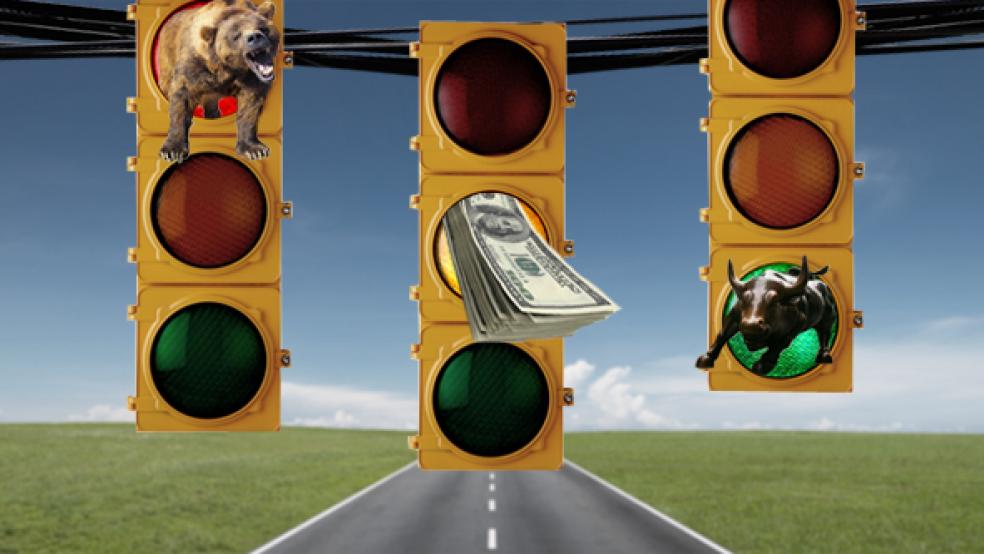As the stock market rally heads toward its sixth month, corporate executives are looking to cash in. Nike (NKE) Chief Financial Officer Donald Blair sold 11,000 shares of his stock in the company – more than $1.2 million worth – earlier this month, according to SEC filings. Michael Kors, the fashion designer and chief creative officer of Michael Kors Holdings (KORS), will unload nearly 3 million shares of his company’s stock, which has almost doubled since its first day of trading in December. The planned sale represents more than 18 percent of his current stake. And Mark Pincus, the CEO of Zynga (ZNGA), plans on selling more than $200 million worth of his stock in a secondary offering of shares in the videogame-maker, which also went public in December.
Across corporate America, as stocks have soared – the S&P 500 is up nearly 30 percent from its October 03, 2011 low, while the Dow Jones industrial average has climbed nearly 25 percent over that time – some top executives and other insiders have turned bearish. Insiders have sold $4.7 billion worth of stock so far this month, putting March on pace for the highest total since last May. And the ratio of selling to buying reached 20.8, the most bearish it’s been since early last year, according to TrimTabs Investment Research, which tracks insider transactions. “What we’ve seen,” says David Coleman, editor of Vickers Weekly Insider Report published by Argus Research, “are levels of sales relative to purchases that we have not seen since about February 2011.”
The increased selling activity fits with previous market cycles. “Historically, what has always happened is as stock prices go up, at some point company buying turns into selling,” says Charles Biderman, CEO of TrimTabs. “It looks like we’re in that price range in the market.” The ramped up selling comes as companies have often been using their built-up cash to buy shares or announce future buyback programs in an attempt to reward shareholders and entice new investors.
“As Wall Street strategists are almost universally urging investors to load up on stocks, insiders are doing the opposite.”
“While corporate insiders are committing plenty of corporate money to repurchase shares, they are massive net sellers with their own money,” Biderman and David Santschi of TrimTabs wrote in a report this week. “As Wall Street strategists are almost universally urging investors to load up on stocks, insiders are doing the opposite.”
Insider selling isn’t the only sign companies think stock prices are high. They have also pulled back on using cash in takeover deals, preferring to use stock instead, Biderman says. New cash takeovers have totaled $17 billion this year, the slowest pace since 2003, according to TrimTabs. And companies in the S&P 500 slowed the rate of share buybacks by nearly 23 percent from the third quarter to the fourth quarter of last year, according to analyst Howard Silverman of Standard & Poor’s. That slowdown has continued in recent weeks, despite a high-profile announcement from Apple (AAPL). Combined with the faster pace at which corporate insiders are selling, that’s a series of bearish signals, Biderman says – “something that happens in the area of tops.”
“In every market, the house has an advantage because they know more than the players."
So should regular investors be paying heed to insider activity and pulling money out of the market too? After all, the insiders are the smart money. “In every market, the house has an advantage because they know more than the players,” Biderman says. “Who knows more about what’s going on, them or you?”
The problem is that insiders aren’t always easy to read correctly. “Insider trading is a signal, but it’s a noisy signal,” says Nejat Seyhun, a professor of finance and business administration at the University of Michigan and the author of “Investment Intelligence from Insider Trading.” For one thing, sales by corporate executives aren’t as telling as their purchases. They might be reducing their holdings for reasons that have little to do with the company – to raise some cash for personal financial reasons, for example, or to diversify their portfolios. Or they might just be taking some profits. “Increasing insider sales coupled with increasing stocks prices is not as worrisome as increasing insider sales while prices are going down,” says Seyhun.
And it’s not unusual for insiders to sell more than they buy. “Since corporate insiders typically receive stock as part of their compensation, it is normal for insiders to sell about 2 shares on the open market for every share they purchase outright,” mutual fund manager John Hussman wrote in a market commentary earlier this month.
This time, though, the numbers could suggest that bulls are due for a breather, especially because insiders have also been trading more actively over the last two months than they had been, on average, over the last five years, according to Coleman of the Vickers Weekly Insiders Report.
Biderman and others say it may be too soon to trade on the trend. “It’s only a few weeks that we’ve seen this heavy selling,” Biderman says. “If it stops and reverses, then this is just a pause. If it continues then this is something to worry about.” But at the very least, it’s a trend worth watching. “We’ve had bearish insider sentiment and high levels of insider participation for two consecutive months now,” Coleman says. “When you have a combination of those two factors, along with the simple fact that the markets have been rallying, if nothing else it’s a cautionary flag to investors.”



